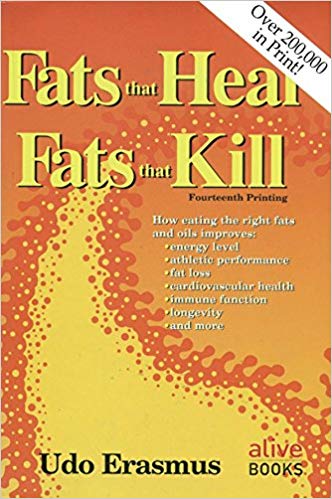By Ben Fuchs | Pharmacist Ben
The most misunderstood and maligned nutrient is undoubtedly fat. Those three letters that are responsible for so much misery and marketing spell out the most powerful and energetically dense of all the macro and micro nutrients human beings and animals consume.
There are two main classes of food fats, which are sometimes referred to as “lipids” : saturated fats which are solid (think lard) and unsaturated fats which are liquid (think corn oil). Liquid oil, i.e. unsaturated fats can contain important components called EFAs and this makes them very, very important. Deficiencies in EFAs are associated with a myriad of health problems including skin issues, degenerative disease, impaired mental health and heart pathology name just a few. Because of the important role unsaturated lipids play in keeping the body strong and healthy, for most part nutrition-mined folks have rationally focused on getting enough those important fats while marginalizing, completely ignoring the significance of their saturated biochemical cousins.
 Until recently that is. In the past couple of years one the most important and functional, (not to mention tasty) of the saturated fats has been getting quite a bit of attention. Coconut Oil for many years vilified and verboten, a heavy, artery clogging, and cholesterol raising generally unhealthy fat, as it turns is not so bad after all. In fact there actually a lot to love about coconut oil!
Until recently that is. In the past couple of years one the most important and functional, (not to mention tasty) of the saturated fats has been getting quite a bit of attention. Coconut Oil for many years vilified and verboten, a heavy, artery clogging, and cholesterol raising generally unhealthy fat, as it turns is not so bad after all. In fact there actually a lot to love about coconut oil!
Another three letters should come to mind when you think about coconut oil: M.C.T. . Coconut Oil is one of nature’s richest sources of MCT. MCT stands for medium chain triglycerides and it is very good stuff. And, coconut oil is 2 thirds MCT, which means in every teaspoonful you’re going to get 3 grams of MCT oil.
So why should you care about MCTs? Two words: weight loss! Well actually there are a lot of things MCTs are good for, they suppress your appetite you can use them for energy really quickly. They’re very satisfying and you’ll find yourself eating less food, and you’ll have more energy to do stuff.
Body builders love MCTs because they go right into the blood, for use they don’t need to be processed before they can be used. As opposed to the long chain fatty acids that comprise most of our dietary fats, MCTs are relatively inert; they don’t really affect digestive chemistry. That’s important, especially if the digestive system is stresses or impaired. MCT’s don’t require bile. For those sans gall bladder, a teaspoonful or two of coconut oil can be a very tasty way to make sure they’re getting fats. We used them alot in the pharmacy when I worked at University Hospital which was a regional center for digestive system health issues. Burt best of all, MCTs don’t get stored like other fats, they’re used! Which makes them an ideal source of fat nutrition for dieters.
And coconut oil has non MCT related features that make it so darn loveable! Most especially it tastes great. Roast some veggie in it and not only do you get stable oil with a high smoke point, and nutritional value, but you get all that in great tasting oil!
You can use coconut oil topically as a moisturizer or hair conditioner, it’s vitamin E content can protect skin and moisturize skin and hair protective and if you mix it up with a little honey or stevia and some fruit flavoring it has some great adult “entertainment” benefits too (use your imagination here!).
If you have a favorite way to use coconut oil I love to know about it. Please fell free to share it in the comments below.

Organic Extra Virgin Coconut Oil
One 54-ounce jar of pure-white, USDA-certified-organic, extra-virgin coconut oil, cold-pressed from fresh coconuts within two hours of chopping; light true-coconut taste, aroma.
Nutiva Certified Organic Extra Virgin Coconut Oil – 54 fl oz


 They’re so effective that they’re the fuel of choice for hospitalized patients being fed intravenously in intensive care units. And MCTs may provide circulatory benefits too. A 2008 study published in The American Journal of Physiology found that MCT intake in rats with high blood pressure improved their cardiac function and structure.
They’re so effective that they’re the fuel of choice for hospitalized patients being fed intravenously in intensive care units. And MCTs may provide circulatory benefits too. A 2008 study published in The American Journal of Physiology found that MCT intake in rats with high blood pressure improved their cardiac function and structure.







